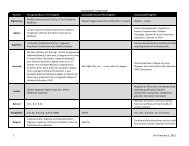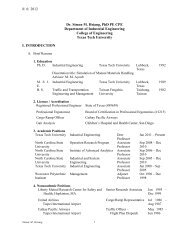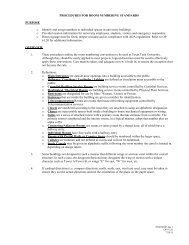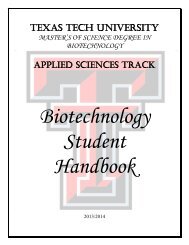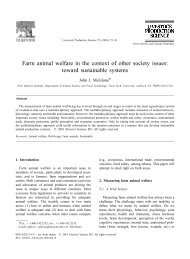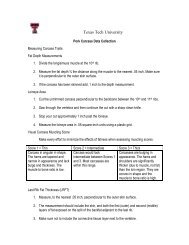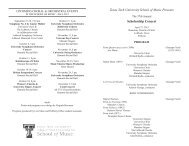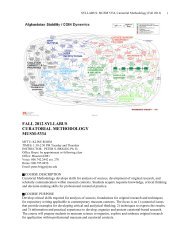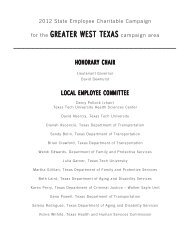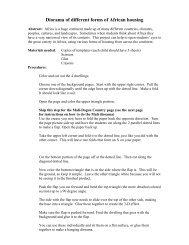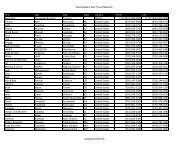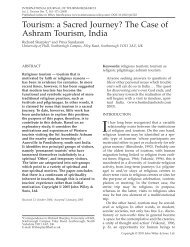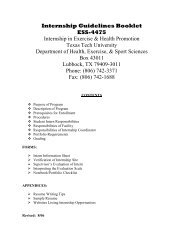Development of Tour Uriely 2005
Development of Tour Uriely 2005
Development of Tour Uriely 2005
Create successful ePaper yourself
Turn your PDF publications into a flip-book with our unique Google optimized e-Paper software.
NATAN URIELY 207<br />
be genuine. Constructive authenticity is associated with those who challenge<br />
the simplistic notion <strong>of</strong> objective authenticity and argue for a<br />
more complex and constructive one (Bruner 1989; Cohen 1988;<br />
Hobsbawn and Ranger 1983; Salamone 1997; Silver 1993). According<br />
to this approach, displayed objects are considered to be authentic<br />
not because they are inherently so but because <strong>of</strong> their construction<br />
as such by tourists or service providers in terms <strong>of</strong> points <strong>of</strong> view, perspectives,<br />
or powers. Therefore, authentic experiences and the authenticity<br />
<strong>of</strong> displayed objects in tourism are considered to constitute one<br />
another. While the early approach <strong>of</strong> objective authenticity concerns<br />
the attributes <strong>of</strong> displayed object solely, the constructive perspective<br />
highlights the role <strong>of</strong> people in the construction <strong>of</strong> attributes associated<br />
with displayed objects. Yet, both perspectives share the position<br />
that authentic experiences derive from visiting attractions provided<br />
by the industry. Unlike both objective and constructive authenticities,<br />
Wang’s (2000) existential authenticity has nothing to do with that <strong>of</strong><br />
the displayed objects. Instead, it corresponds to a potential existential<br />
state <strong>of</strong> being, which is activated by the participant practices. According<br />
to this perspective, tourists may feel that they themselves are much<br />
more authentic when they engage in nonordinary activities, in which<br />
they are more freely self-expressed than in daily life.<br />
While the growing attention that is given to the subjectivity <strong>of</strong> tourist<br />
experiences is clearly evident in the contexts <strong>of</strong> typologies and the<br />
study <strong>of</strong> authenticity, a similar development seems to be instigated<br />
within the study <strong>of</strong> heritage tourism (Poria, Butler and Airey 2003)<br />
and urban tourism (Page 2002). In this context, Poria and colleagues<br />
have recently challenged the inclination <strong>of</strong> previous studies to focus solely<br />
on the supply <strong>of</strong> heritage attractions and its management (Crange<br />
1999; Halewood and Hannam 2001; Hewison 1987; Garrod and Fyall<br />
2000; Seale 1996). Instead, they suggest that individuals’ subjective perceptions<br />
and behaviors are the core elements <strong>of</strong> heritage tourism experiences<br />
and thus require emphasis. This point <strong>of</strong> view is also<br />
highlighted by Ashworth (1998) who suggests that different individuals<br />
perceive and encounter heritage spaces in different ways based on<br />
their cultural background. Moreover, similar to Wang’s notion <strong>of</strong> existential<br />
authenticity, Uzzell suggests that ‘‘museums and interpretive<br />
centers can be seen as places where people come to understand themselves’’<br />
(1998:16).<br />
Toward Relative Interpretations. The question whether the distinction<br />
made in the literature between modern and postmodern tourism reflects<br />
upon concrete developments in the nature <strong>of</strong> the tourist experience<br />
is a matter <strong>of</strong> intellectual debate. Yet, a comparison between the<br />
early theories <strong>of</strong> modern tourism and later conceptualizations <strong>of</strong> postmodern<br />
tourism reveals significant differences in terms <strong>of</strong> style and<br />
form <strong>of</strong> theorizing. Specifically, it is suggested that while the former<br />
conceptualize the tourist experience in terms <strong>of</strong> absolute truths, the<br />
latter make use <strong>of</strong> concepts <strong>of</strong> relative truths. Thus, unlike the debates<br />
between competing theories <strong>of</strong> modern tourism, the discourse between<br />
different approaches <strong>of</strong> postmodern tourism is characterized<br />
by compromising statements.



